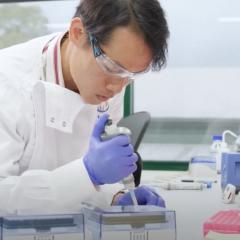A potential new approach to administering an existing Japanese encephalitis (JE) vaccine could make it more affordable and increase dose numbers in Australia.
Researchers from The University of Queensland and QIMR Berghofer Medical Research Institute, along with Dr Deb The Travel Doctor, are investigating the efficacy of a smaller, intradermal dose of a JE vaccine.
UQ’s Dr Luis Furuya-Kanamori said the research was only in the preliminary phase, but the initial results were encouraging.
“Participants were given a micro-dose of an existing vaccine into the top layer of the skin rather than in the deeper layers,” Dr Furuya-Kanamori said.
“After eight weeks, the first 11 participants had all produced good antibody levels without severe adverse events,” Dr Furuya-Kanamori said.
“What it means is this potential approach could lower the cost of JE vaccination and protect four times as many people per vaccine vial.”
Japanese encephalitis is a potentially deadly arbovirus transmitted by mosquitos that causes high levels of human disease in many countries including China, India, Philippines, and Vietnam.
“We first started this research looking for a way to increase the rate of vaccination among Australians travelling to countries and areas with the virus,” Dr Furuya-Kanamori said.
“While there are widely used and effective JE vaccines available in Australia, the problem is they cost about $300 for travellers, so many people simply don’t get vaccinated.
“Australia also currently has limited vaccine doses.”
The clinical research is timely with JE cases detected in four Australian states in recent months, leading to the declaration of a Communicable Disease Incident of National Significance.
Associate Professor Greg Devine from QIMR Berghofer said the sudden outbreak highlighted the importance of making vaccine stocks go further at times of increased demand.
“As the trial proceeds, we’ll determine whether the micro-dose consistently produces the required antibody levels across a much larger group of people,” Dr Devine said.
“Our preliminary results reflect similar findings for the low dose intradermal administration of other vaccines including Yellow Fever and rabies vaccines.”
The trial is being conducted in collaboration with Dr Deb The Travel Doctor in Brisbane with participants providing a blood sample before receiving the vaccine, followed by two further samples after four and eight weeks.
Co-investigators include Dr Deborah Mills and Christine Mills from Dr Deb The Travel Doctor, Dr Narayan Gyawali from QIMR Berghofer, and Professor Colleen Lau from UQ’s School of Public Health.
More information about participating in trial can be found via this website.
Media: Dr Luis Furuya Kanamori, l.furuya@uq.edu.au, +61 (0)487 448 584; UQ Communications, med.media@uq.edu.au, +61 (0)436 368 746; QIMR Berghofer, media@qimrberghofer.edu.au, +61 (0)427 179 216.



